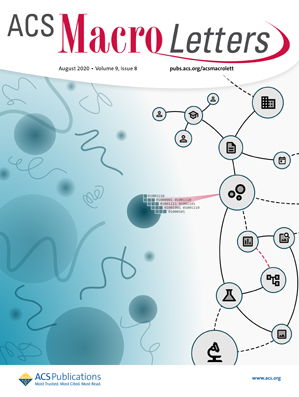作为具有机械竞争力和化学可回收材料的烷基取代聚己内酯聚脲
IF 5.1
Q1 POLYMER SCIENCE
引用次数: 0
摘要
我们报告了在热塑性聚氨酯(TPUU)材料中采用烷基取代的聚(ε-己内酯)(PCL)作为软段的机械性能和化学回收优势。制备了聚(4-甲基己内酯)(P4MCL)和聚(4-丙基己内酯)(P4PrCL),与异佛尔酮二异氰酸酯反应,并用水扩链形成 TPU。由于 P4MCL 和 P4PrCL 具有非结晶性,因此与 PCL 类似物相比,所得材料的拉伸性能与市售的聚酯热塑性聚氨酯相似或更优。此外,以氯化锌(ZnCl2)为催化剂,在高温减压(240-260 °C,25-140 mTorr)条件下采用反应蒸馏法,通过闭环解聚从 TPUU 材料中高产率地回收了单体。利用 Van't Hoff 分析法估算了 4MCL 和 4PrCL 的聚合热力学;这些结果表明,4PrCL 中的丙基导致 P4PrCL 的实际上限温度 (Tc) 较低。本文章由计算机程序翻译,如有差异,请以英文原文为准。

Alkyl-Substituted Polycaprolactone Poly(urethane-urea)s as Mechanically Competitive and Chemically Recyclable Materials
We report the mechanical performance and chemical recycling advantages of implementing alkyl-substituted poly(ε-caprolactones) (PCLs) as soft segments in thermoplastic poly(urethane-urea) (TPUU) materials. Poly(4-methylcaprolactone) (P4MCL) and poly(4-propylcaprolactone) (P4PrCL) were prepared, reacted with isophorone diisocyanate, and chain-extended with water to form TPUUs. The resulting materials’ tensile properties were similar or superior to a commercially available polyester thermoplastic poly(urethane) and had superior elastic recovery properties compared to a PCL analogue due to the noncrystalline nature of P4MCL and P4PrCL. Additionally, monomers were recovered from the TPUU materials in high yields via ring-closing depolymerization using a reactive distillation approach at an elevated temperature and a reduced pressure (240–260 °C, 25–140 mTorr) with zinc chloride (ZnCl2) as the catalyst. The thermodynamics of polymerization were estimated using Van’t Hoff analyses for 4MCL and 4PrCL; these results indicated that the propyl group in 4PrCL results in a lower practical ceiling temperature (Tc) for P4PrCL.
求助全文
通过发布文献求助,成功后即可免费获取论文全文。
去求助
来源期刊
CiteScore
10.40
自引率
3.40%
发文量
209
审稿时长
1 months
期刊介绍:
ACS Macro Letters publishes research in all areas of contemporary soft matter science in which macromolecules play a key role, including nanotechnology, self-assembly, supramolecular chemistry, biomaterials, energy generation and storage, and renewable/sustainable materials. Submissions to ACS Macro Letters should justify clearly the rapid disclosure of the key elements of the study. The scope of the journal includes high-impact research of broad interest in all areas of polymer science and engineering, including cross-disciplinary research that interfaces with polymer science.
With the launch of ACS Macro Letters, all Communications that were formerly published in Macromolecules and Biomacromolecules will be published as Letters in ACS Macro Letters.

 求助内容:
求助内容: 应助结果提醒方式:
应助结果提醒方式:


